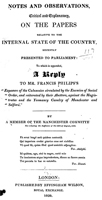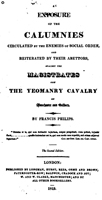
The Peterloo Massacre - Manchester 16th August 1819
TRANSCRIPTION OF : 'NOTES & OBSERVATIONS, Critical & Explanatory, on the Papers Relative to Page 141-146 A REPLY, WHEN I first saw the advertisement of Mr. Phillips's pamphlet, I was, from the title, naturally led to suppose that it would contain an enumeration of the various calumnies, to which, in his opinion, the magistrates and yeomanry have been subjected - that distinct charges would have been distinctly refuted; that specific misrepresentations would have been pointed out; and finally, that facts, which had been hitherto carefully withheld from the knowledge of the public, would have been brought forward in their justification. It would require a space greater than I can devote to this part of my subject, were I to attempt to trace even a rapid sketch of the gradual alteration of opinion and feeling in the minds of the labouring classes. Suffice to observe, (it is the Weavers to whom I am principally alluding,) that in proportion as the lengthened continuance of the war produced a two-fold diminution of their comforts, by reducing the rate of their wages, at the same time that the imposition of fresh taxes, and the advanced price of articles of food, necessarily increased their expenditure; their political feelings, (rather than principles) underwent a rapid change; they began to doubt the wisdom of measures which brought to them only an accession of misery: it was no longer possible to get up from amongst them a Church and King Riot; they began openly to express their dislike of the policy of the Ministry of the day, and they have ever since been taunted and vilified by charges of disaffection and disloyalty. In the spring of the year 1808, they attempted to obtain an act of parliament for the permanent regulation of their wages. Disappointed in this object, they met at the latter end of May in St. George's Fields. They assembled on successive days; attempts were made to induce them to depart peaceably, and it was not until after those attempts had been found unsuccessful, and the people (supposed to amount to 10 or 15,000 men) had continued assembled more than an hour after the reading of the riot act, that military force was called in to disperse them, which object was effected with little further injury than the loss of one life. Upon this occasion, some acts of violence and undoubted illegality were committed by the Weavers; such, for instance, as interfering to prevent work being taken out at a price less than they chose to fix. In the spring of 1812, commercial distress was at its height. The orders in council of our own Government, with the prohibitory commercial decrees of the United States, and of France, together with the failure of some ill-judged speculations, had for the time almost annihilated the foreign commerce of the country. The manufacturer and merchant suffered dreadfully from the bankruptcies, with which the columns of the gazette teemed; whilst the operatives were reduced to penury and distress, not merely by the reduction of wages, but by the difficulty of obtaining work. Add to this the introduction into our manufactories, about the same time, of some important improvements in machinery, which, by abridging the demand for human labour at a period when other circumstances had rendered the supply superabundant, materially increased the sufferings, and consequently the irritation, of the people. Thus,in Nottinghamshire, popular fury was directed against the stocking frames; in the West. Riding of Yorkshire, against the cropping machines; and in this county and Cheshire, against blowing machines and steam looms. One would have thought, that these natural, obvious, and sufficient, causes of the irritation and violence of our manufacturing population at that period, might have been universally recognized as the true ones; and that no mischievous or perverted ingenuity would have attempted to represent the unjustifiable excesses, resulting from severe suffering and ignorant prejudice, as the offspring of political disaffection. However great might he the guilt of the deluded actors at that melancholy period, (and it extended even to assassination,) no one could be so hardy as to deny the existence and the severity of their sufferings; yet, some there were, whose political and religious bigotry gladly made the infuriated proceedings of a misguided populace the pretext for endeavouring to throw obloquy and suspicion upon men of the most undoubted respectability and character. But, upon this part of my subject, I should be inexcusable if I did not avail myself of the assistance of those means of information, which are furnished by the statements of my estimable friend, Dr. Taylor, (late of Bolton.) Referring to the reports, which at one time had been most industriously circulated, that "those disturbances originated in political disaffection, or religious dissent," Dr. Taylor, (in his Letters on the subject of the Lancashire Riots, in the year 1812,) observes, "An opinion so totally groundless can be viewed only as the offspring of an overheated and distempered imagination; and the pertinacity with which it has been maintained, in despite of all evidence, might in some persons have been considered as a fit subject only for pity or for ridicule. But, when such mischievous fancies are obstinately indulged in by men, whose situations in life give us a right to expect, that they should form no opinion on such subjects without the most substantial grounds - when it is found that men, whose authority can command access to the condemned cells of a prison, chuse to abuse this melancholy privilege, by base attempts to strengthen these hateful prejudices, they then become matter of very serious alarm; and when there was also reason to suspect that the fanciful reports of such men had been transmitted to Government with the intention of exciting an alarm, whereon to ground a suspension of the constitutional laws of the country; it then became the bounden duty of every one who respected that constitution, or who regarded the welfare ·and happiness of his neighbourhood, to do his utmost- to remove from the minds of Government any false impressions thereby produced, and to oppose, as far as in him lay, the granting of new, and discretionary, and uncontrolled powers, to men who had so grossly abused the powers already entrusted to them." With the objects disclosed in the preceding extract, Dr. Taylor and some of his friends proceeded to London. They offered themselves to be examined before the secret Committee of Parliament, which was appointed for the express purpose of examining "records and persons," but their evidence was refused. It is not my intention to go through the whole of the very important statements made by Dr. Taylor. The limits of my plan would not admit of it, and it would be in some degree foreign from my design. Some further reference to them will, however, be necessary hereafter, in order to enable the readers to form a correct opinion as to some circumstances noticed in Mr. Philips's Pamphlet. Though the period to which the preceding quotation from Dr. Taylor relates, is subsequent to the attack on the Manchester Exchange, in April 1812, it is necessary that I should, at some length, call the attention of the reader to that event, both because it is the first in the series of the Riots of that year, selected by Mr. Philips for observation; and, because, the circumstances of the case have, on several recent occasions, been assiduously and ingeniously misrepresented. In a note to page xxvi. Mr. Philips says, with reference to the "declaration and protest, had a public meeting been convened, it would have been attended by the Radicals, who would have out-numbered and overpowered the respectable inhabitants, and probably proceeded to demolish the Exchange, as was the case in 1812." The natural conclusion of any person upon reading this sentence, would be, first, that the attack upon the Exchange in 1812, was the consequence of a public meeting, and secondly, that the Exchange was demolished. The facts of the case, widely different from this representation, were as follows: - ***************************************************************
'NOTES & OBSERVATIONS, Critical & Explanatory, on the Papers Relative to the Internal State of the Country, Recently Presented to Parliament; to which is appended, a REPLY to Mr. Francis Philips's 'Exposure of the Calumnies circulated by the Enemies of Social Order ...' Transcribed by Sheila Goodyear 2019 LINK to full .pdf document of 'Notes & Observations ...'
on the Internet Archive website to read or download. |
||||||||||||||||||||||||||||||||||||||||||||||||||||||

